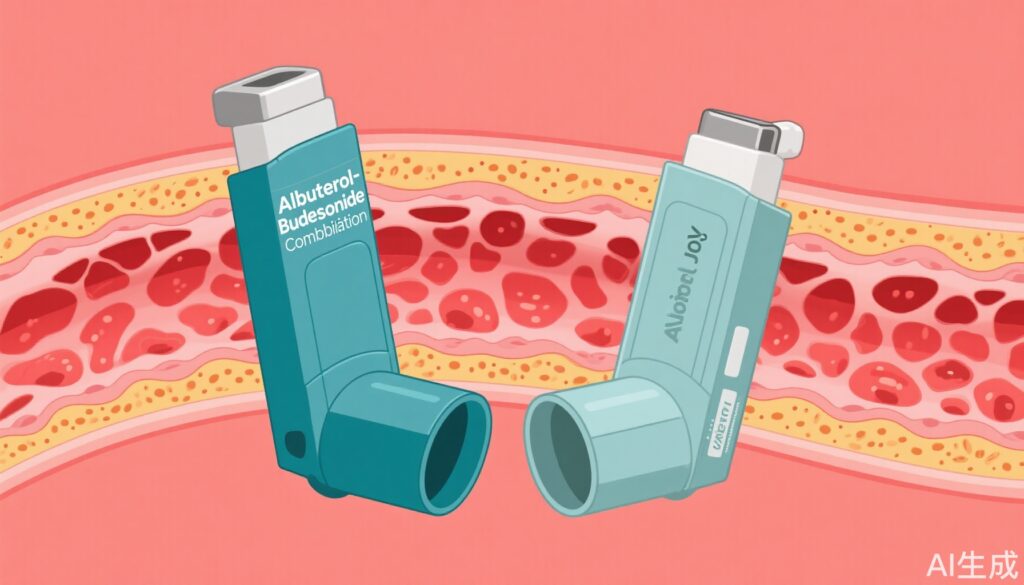Highlights
– As-needed albuterol–budesonide reduces severe exacerbations in mild asthma compared to as-needed albuterol alone.
– Combination therapy leads to lower systemic glucocorticoid use and preserves rapid bronchodilation.
– Efficacy and safety are confirmed in large, rigorously designed randomized controlled trials.
Clinical Background and Disease Burden
Asthma is a prevalent chronic respiratory disease, affecting over 300 million individuals worldwide. Mild asthma constitutes the majority of asthma cases but is still associated with significant morbidity, including risk of severe exacerbations that can result in emergency care or hospitalization. Traditionally, patients with mild asthma have relied on short-acting beta-agonists (SABAs) such as albuterol for symptom relief, with or without maintenance inhaled corticosteroids. However, reliance on SABAs alone does not address the underlying airway inflammation, leaving patients vulnerable to exacerbations. There is a clear unmet need for therapies that can both relieve symptoms and reduce exacerbation risk in this population.
Research Methodology
Two major phase 3 randomized controlled trials directly addressed the efficacy and safety of as-needed albuterol–budesonide in mild (and mild-to-moderate) asthma:
BATURA Study (LaForce et al., NEJM, 2025):
– Design: Fully virtual, decentralized, multicenter, double-blind, event-driven trial.
– Population: 2,516 participants aged ≥12 years with mild asthma uncontrolled by SABA (with/without low-dose inhaled corticosteroid or leukotriene receptor antagonist).
– Interventions: Randomized 1:1 to as-needed albuterol–budesonide (180/160 µg) vs as-needed albuterol (180 µg), up to 52 weeks.
– Primary Endpoint: Time to first severe asthma exacerbation (on-treatment efficacy population). Secondary endpoints included exacerbation rate and systemic glucocorticoid exposure.
DENALI Study (Chipps et al., Chest, 2023):
– Design: Phase 3, double-blind, parallel-group trial.
– Population: 1,001 patients (989 evaluable, ≥12 years) with mild-to-moderate asthma.
– Interventions: Randomized to four-times-daily albuterol–budesonide (180/160 µg or 180/80 µg), albuterol (180 µg), budesonide (160 µg), or placebo for 12 weeks.
– Dual Primary Endpoints: Change from baseline in FEV1 AUC0-6h (0-6 hours) over 12 weeks (albuterol effect) and trough FEV1 at week 12 (budesonide effect).
Key Findings
BATURA Study:
– Severe exacerbations occurred in 5.1% of the albuterol–budesonide group vs 9.1% in the albuterol group (hazard ratio [HR], 0.53; 95% CI, 0.39–0.73) in the on-treatment population (P<0.001).
– Intention-to-treat analysis showed similar benefit: 5.3% vs 9.4% (HR, 0.54; 95% CI, 0.40–0.73; P<0.001).
– Annualized severe exacerbation rate: 0.15 (combination) vs 0.32 (albuterol alone); rate ratio, 0.47 (95% CI, 0.34–0.64).
– Mean annualized systemic glucocorticoid dose was significantly lower in the combination group (23.2 mg vs 61.9 mg).
– Adverse events were similar between groups, supporting a favorable safety profile.
DENALI Study:
– FEV1 AUC0-6h over 12 weeks was greater with albuterol–budesonide 180/160 µg vs budesonide 160 µg alone (LSM difference, 80.7 mL; 95% CI, 28.4–132.9; P=.003).
– Trough FEV1 at week 12 was significantly higher for albuterol–budesonide (both doses) vs albuterol alone (LSM difference, 132.8 mL and 120.8 mL; both P<.001).
– Onset and duration of bronchodilation with the combination were similar to albuterol alone, confirming preserved rapid relief.
– The combination’s adverse event profile was comparable to the individual components.
Mechanistic Insights and Biological Plausibility
The combination of albuterol (a rapid-acting bronchodilator) and budesonide (an inhaled corticosteroid) provides both immediate symptom relief and anti-inflammatory action at the time of use. This dual mechanism targets the acute bronchospasm and the underlying airway inflammation responsible for exacerbations, supporting the observed clinical benefits.
Expert Commentary and Guideline Context
Recent GINA (Global Initiative for Asthma) guidelines have increasingly favored anti-inflammatory reliever therapy over SABA-only regimens for mild asthma, reflecting growing evidence that addressing airway inflammation even in mild disease reduces exacerbation risk. The BATURA and DENALI studies provide robust, late-phase trial support for this approach. As Dr. Chipps and colleagues noted, “the combination inhaler offers a practical, patient-centered alternative that can reduce exacerbations without sacrificing rapid symptom control.”
Controversies and Limitations
– BATURA’s fully virtual, decentralized design enhances real-world applicability but may introduce selection biases related to technology access.
– DENALI’s fixed dosing and four-times-daily regimen do not precisely mirror as-needed use patterns but do clarify pharmacodynamic effects.
– Neither study included children under 12, limiting pediatric generalizability.
– The longer-term impact beyond one year remains to be established, as does the effect in populations with significant comorbidities or differing asthma phenotypes.
Conclusion
As-needed use of fixed-dose albuterol–budesonide inhaler represents a clinically significant advance for patients with mild asthma inadequately controlled by SABA alone. The combination reduces severe exacerbations, lowers systemic corticosteroid exposure, and maintains rapid bronchodilation with a safety profile comparable to standard therapy. These findings support a paradigm shift toward anti-inflammatory reliever therapy in the management of mild asthma, aligning with evolving guideline recommendations.
References
1. LaForce C, Albers F, Danilewicz A, et al. As-Needed Albuterol-Budesonide in Mild Asthma. N Engl J Med. 2025 Jul 10;393(2):113-124. doi: 10.1056/NEJMoa2504544 IF: 78.5 Q1 .2. Chipps BE, Israel E, Beasley R, et al. Albuterol-Budesonide Pressurized Metered Dose Inhaler in Patients With Mild-to-Moderate Asthma: Results of the DENALI Double-Blind Randomized Controlled Trial. Chest. 2023 Sep;164(3):585-595.
3. Global Initiative for Asthma (GINA). Global Strategy for Asthma Management and Prevention, 2024. Available from: https://ginasthma.org/



